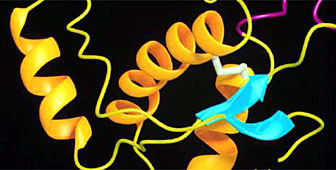Swiss advance on possible transmission of mad cow disease

A group of Swiss-based scientists has announced progress in determining how mad cow disease may be transferred from animals to human beings.
The team from the Federal Institute of Technology (ETH) in Zurich discovered great similarities between the molecular structure of healthy prion proteins in human beings and those in cattle. The prion protein is involved in the development of both Mad Cow Disease (BSE) in cattle and its human variant, Creutzfeldt-Jakob disease (CJD).
The almost identical nature of the molecular structure could help identify how BSE is transferred to humans. This could prove the link between the consumption of certain meat products from cattle and the deadly CJD.
The only difference in the structure of bovine and human prion proteins is in the distribution of the electrostatic surface charge, a news conference in Zurich was told.
The research team, from the Institute for Molecular Biology and Biophysics at the ETH, has published its findings in the latest edition of the prestigious United States scientific journal “Proceedings of the National Academy of Sciences”.
In the journal, the ETH researchers, led by Professor Kurt Wüthrich, describe for the first time the spatial structure of the bovine prion protein in its normal healthy form. There are differences in the distribution of the electronic surface charge, but not in the spatial folding of the protein.
Up to the end of 1999 about 50 people, mainly in Britain, died from the so-called new variant of Creutzfeld-Jakob (nv CJD). Scientists believe that eating cattle meat infected with BSE could cause this disease.
According to the ETH researchers, their latest findings could also lead to ways of preventing the transmission of prion-dependent diseases between different animals.
by Tom O’Brien

In compliance with the JTI standards
More: SWI swissinfo.ch certified by the Journalism Trust Initiative
You can find an overview of ongoing debates with our journalists here. Please join us!
If you want to start a conversation about a topic raised in this article or want to report factual errors, email us at english@swissinfo.ch.